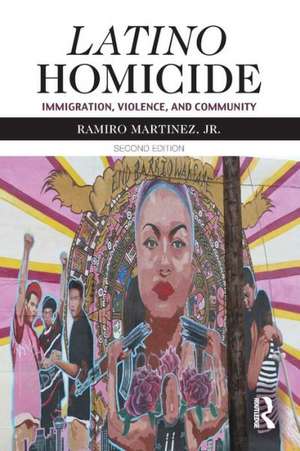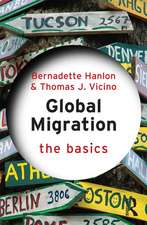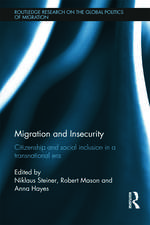Latino Homicide: Immigration, Violence, and Community: Criminal Justice Series
Autor Ramiro Martinez, Jr.en Limba Engleză Paperback – 12 noi 2014
| Toate formatele și edițiile | Preț | Express |
|---|---|---|
| Paperback (1) | 410.46 lei 43-57 zile | |
| Taylor & Francis – 12 noi 2014 | 410.46 lei 43-57 zile | |
| Hardback (1) | 1108.37 lei 43-57 zile | |
| Taylor & Francis – 4 dec 2014 | 1108.37 lei 43-57 zile |
Preț: 410.46 lei
Nou
Puncte Express: 616
Preț estimativ în valută:
78.54€ • 82.21$ • 65.37£
78.54€ • 82.21$ • 65.37£
Carte tipărită la comandă
Livrare economică 31 martie-14 aprilie
Preluare comenzi: 021 569.72.76
Specificații
ISBN-13: 9780415536530
ISBN-10: 0415536537
Pagini: 224
Ilustrații: 6 black & white tables, 20 black & white line drawings
Dimensiuni: 152 x 229 x 13 mm
Greutate: 0.32 kg
Ediția:Revised
Editura: Taylor & Francis
Colecția Routledge
Seria Criminal Justice Series
Locul publicării:Oxford, United Kingdom
ISBN-10: 0415536537
Pagini: 224
Ilustrații: 6 black & white tables, 20 black & white line drawings
Dimensiuni: 152 x 229 x 13 mm
Greutate: 0.32 kg
Ediția:Revised
Editura: Taylor & Francis
Colecția Routledge
Seria Criminal Justice Series
Locul publicării:Oxford, United Kingdom
Cuprins
1. INTRODUCTION: LATINOS AND VIOLENT CRIME 2. THE LEGACY AND IMAGES OF LATINO CRIME 3. THE EMERGENCE OF LATINOS AND LATINO COMMUNITIES: LOCAL CONTEXT AND CONTEMPORARY CRIME 4. THE ORIGINS OF LATINO COMMUNITIES 5. THE ROOTS OF HOMICIDE IN THE BARRIO AND ENCLAVE 6. THE ETHNIC AND IMMIGRANT HOMICIDE CONTRAST 7. RHETORIC AND REALITY: LATINO HOMICIDE MOTIVES 8. THE SAN ANTONIO BARRIO BECKONS, 1950-2010 9. CONCLUSION: STILL MOVING BEYOND RACE AND HOMICIDE RESEARCH
Recenzii
"The first edition of Latino Homicide introduced a landmark study that galvanized a generation of researchers toward understanding the Latino paradox. Ten years later, the second edition situates Dr. Martinez’s methodological rigor during a time of continued anti-immigrant rhetoric and punitive immigration policies. This story of six urban Latino communities demonstrates the importance of utilizing hard evidence and empirical research to inform policy."
Robert J. Durán, Sociology, University of Tennessee, and author of Gang Life in Two Cities: An Insider’s Journey
"This is an excellent book which pays important attention to homicide rates within Latino communities. This book is a timely contribution because it explores the intersections of crime, economic disadvantage, and immigration in the United States. It makes a compelling point that Latino communities are more resilient to poverty which reduces homicide rates in their communities. It is indeed a must read for criminologists, sociologists and scholars who study stratification and inequality across places."
-Patricia Warren, Criminology and Criminal Justice, Florida State University
"Hispanics will constitute nearly one-third of all Americans by 2050, with a much larger fraction of our youthful population, and whether they tend to have high crime rates or ordinary crime rates will largely determine the future of our society. Yet this vital question has been almost totally ignored by the academic community, allowing the often lurid ideological claims of media pundits to fill the vacuum. Therefore, LATINO HOMICIDE by Prof. Ramiro Martinez, Jr. constitutes a uniquely important and welcome contribution to this important but underexamined topic."
Ron Unz, Former Publisher of The American Conservative, Author of "The Myth of Hispanic Crime"
Robert J. Durán, Sociology, University of Tennessee, and author of Gang Life in Two Cities: An Insider’s Journey
"This is an excellent book which pays important attention to homicide rates within Latino communities. This book is a timely contribution because it explores the intersections of crime, economic disadvantage, and immigration in the United States. It makes a compelling point that Latino communities are more resilient to poverty which reduces homicide rates in their communities. It is indeed a must read for criminologists, sociologists and scholars who study stratification and inequality across places."
-Patricia Warren, Criminology and Criminal Justice, Florida State University
"Hispanics will constitute nearly one-third of all Americans by 2050, with a much larger fraction of our youthful population, and whether they tend to have high crime rates or ordinary crime rates will largely determine the future of our society. Yet this vital question has been almost totally ignored by the academic community, allowing the often lurid ideological claims of media pundits to fill the vacuum. Therefore, LATINO HOMICIDE by Prof. Ramiro Martinez, Jr. constitutes a uniquely important and welcome contribution to this important but underexamined topic."
Ron Unz, Former Publisher of The American Conservative, Author of "The Myth of Hispanic Crime"
Notă biografică
Ramiro Martínez, Jr. is a Professor in the School of Criminology and Criminal Justice and the Department of Sociology and Anthropology. Over the past fifteen years, Dr. Martinez has received several honors and awards. In 2011, he was a recipient of American Society of Criminology DPCC's Lifetime Achievement for outstanding scholarship in the area of race, crime, and justice. A native of San Antonio, Texas he now resides in Boston Massachusetts.
Descriere
Latino Homicide is the first empirically based, but readable book for courses to counter the conventional wisdom that immigrant populations only contribute crime to their communities. For this second edition, Martinez further emphasizes his argument with updated data and the addition of a new city, San Antonio. With fascinating case studies from police reports and actual cases from six varied cities, Latino homicide rates are revealed to be markedly lower than one would expect, given the economic deprivation of these urban areas. Far from dangerous or criminal, these communities often have exceptionally strong social networks precisely because of their shared immigrant experiences. Martinez skillfully refutes negative stereotypes in a coherent and critically rigorous analysis of the issues.




















